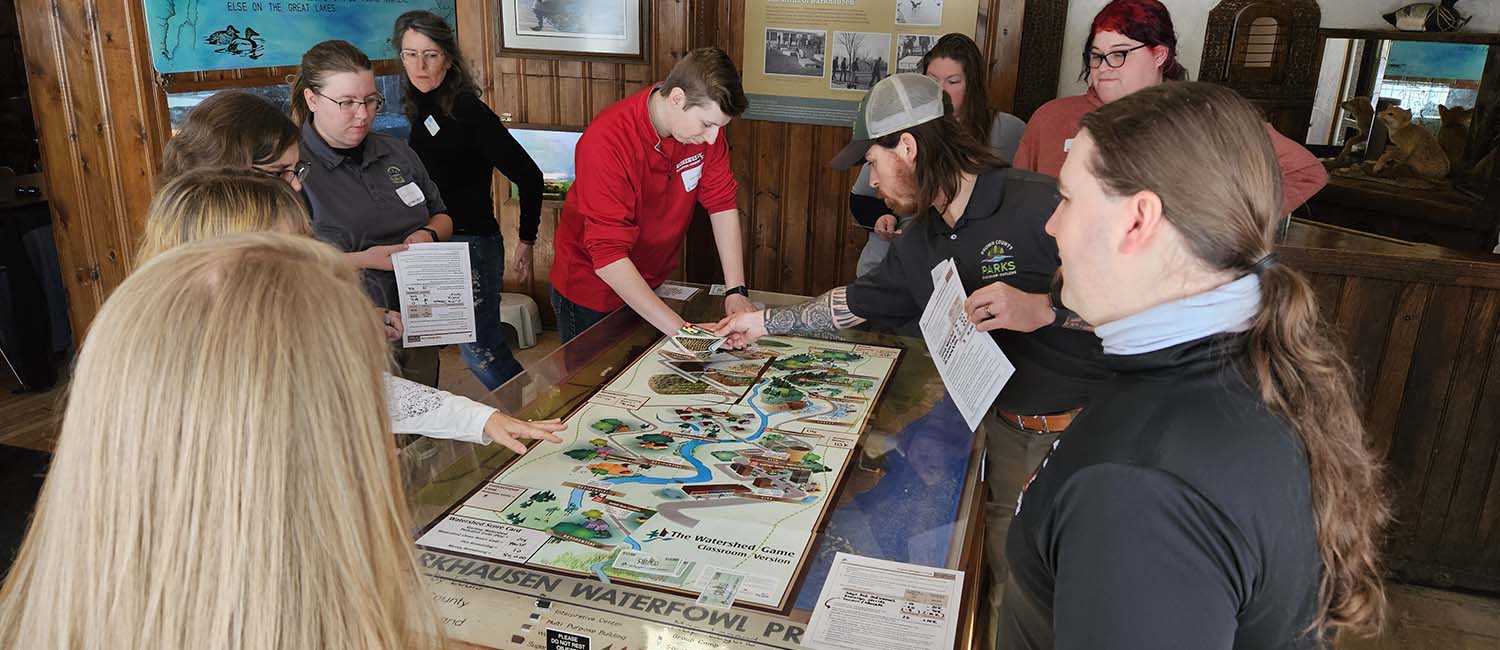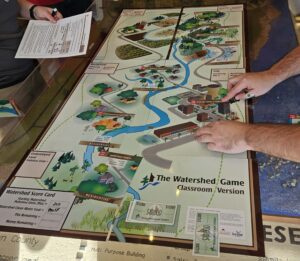
At a workshop hosted by UW-Green Bay and funded by Freshwater Collaborative of Wisconsin and Sea Grant, educators from northeast Wisconsin learned how to play and teach the Sea Grant Watershed Game, an interactive board game that helps students and local leaders understand the connection between land use and water quality. Through a series of active, hands-on simulations, participants learn how land-use decisions impact water quality and natural resources. The game is used in more than 15 states across the country. (Photo by Emily Tyner, UW-Green Bay)
On a bitterly cold morning in January, teachers and educators from around northeast Wisconsin gathered at Barkhausen Waterfowl Preserve to learn how to play and teach the Sea Grant Watershed Game.
The interactive board game helps students and local leaders understand the connection between land use and water quality. Through a series of active, hands-on simulations, participants learn how land-use decisions impact water quality and natural resources. The game is used in more than 15 states across the country.
The workshop, which was organized by UW-Green Bay, focused on the Stream Model version of the game. Kathy Biernat, owner of Zanilu Educational Services, and Anne Moser, senior special librarian and education coordinator at Wisconsin Sea Grant, introduced the watershed concept through a fun version of “three truths and a lie” about watersheds. They then walked through lesson plans and stewardship concepts to accompany the Watershed Game.
To play, the educators divided into groups, with each group representing a community they that needs to reduce excess phosphorus runoff. They debated land-use decisions, the costs and benefits of implementing land-use changes, and the trade-offs of various flood resiliency actions for their community.

A Freshwater Collaborative grant provided each workshop participant with a copy of the game to use in their classrooms and programs. (Photo by Emily Tyner/UW-Green Bay)
After a spirited game, Biernat and Moser led educators through a discussion of how they might implement the Stream Model into their classrooms and educational venues. They also discussed other classrooms activities that would support lessons around nonpoint source pollution and community decision-making for water quality. Each educator took home a Stream Game and lesson plans for implementing the activity in their school.
Logan Lassee, an assistant naturalist at Brown County Parks Department, plans to incorporate the game into a recycling program for fifth and sixth graders.
“The workshop was an exciting event where there was collaboration amongst educators from many different areas of education,” he says. “I personally thought this game was a very fun and a realistic approach to understanding how land and water use can affect the ecosystem on a larger scale.”
Andrea Stromeyer, the education programs coordinator at the Door County Maritime Museum, is familiar with watersheds but new to bringing STEM programming to a history museum. She appreciates the framework the game provides.
“This game touches on points about land management surrounding watersheds that I didn’t previously think to add into my classroom discussions,” she says. “I especially love how I can scaffold this up or down depending on the ages of students and sizes of classes.”
Stromeyer plans to incorporate the game into Great Lakes Literacy-based programs this summer. She and her colleagues have also been thinking about interesting expansion ideas relevant to their specific Door County area.
“I’m thankful to the Freshwater Collaborative and the other hosts of this workshop for supporting Wisconsin educators by providing us copies of the game,” she adds.
This workshop was primarily sponsored by the Freshwater Collaborative of Wisconsin with support from Wisconsin Sea Grant. Emily Tyner and Lynn Terrien at UW-Green Bay planned and organized the workshop as part of a Freshwater Collaborative–supported grant. Learn more about UW-Green Bay’s Educators and Students Rise to Freshwater Challenges programs at www.uwgb.edu/freshwater-collaborative.
Written by Heidi Jeter, Freshwater Collaborative of Wisconsin
Link to original story: https://freshwater.wisconsin.edu/watershed-game/
